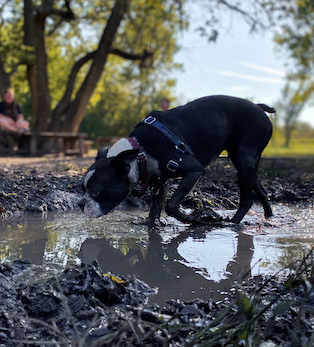
What are common puppy illnesses and what should you look out for? What do you do when your puppy is sick? Keeping puppies safe and healthy is one of the biggest responsibilities of pet owners. You may want to put your puppy in a little bubble until they receive all of their vaccinations. However, the socialization process with puppies is extremely important to their long-term behavior health. So what should you look out for with your new puppy? Below are some of the common puppy illnesses you may see in your puppy and a few of the more serious diseases to look out for.
Parasites
When your vet asks for a fecal sample, they are typically testing for parasites. Giardia or other parasites, like tapeworm, hookworm, heartworm, etc., are common illnesses for puppies. The parasite passes through contaminated soil or water. In some cases, mothers transfer parasites to their puppies before birth! When left untreated, parasites in puppies can cause major problems. However, most of the time, you only notice diarrhea or some gastrointestinal upset. Veterinarians commonly prescribe dewormers and/or antibiotics to treat the parasite. In the meantime, you’ll have to clean up and sanitize after your puppy does their business. This prevents the parasite from being reintroduced to their body.
Kennel Cough
Kennel cough is another common puppy illness. Kennel cough is a highly contagious disease that causes cold-like symptoms, such as hacking cough, runny nose, sneezing, lethargy, loss of appetite, and/or fever. The technical name is canine infectious tracheobronchitis. Most dogs will overcome the illness in a week or two, but in severe cases, your vet might prescribe antibiotics and cough medicine. Because puppies can contract it through respiratory droplets, puppies easily spread kennel cough in close contact with one another, especially while playing. This is why the disease spreads so easily in daycares, boarding, and other “kennel” facilities.

Urinary Tract Infection
Although less common than parasites or kennel cough, urinary tract infections are a disease found in puppies and adult dogs, more commonly in females. It can be especially hard to diagnose in puppies, due to their already frequent potty trips. Look for excessive licking of the genitals, multiple attempts to urinate in one potty trip, whining or crying when urinating, and accidents in the house that are out of the ordinary. Veterinarians will diagnose a UTI by testing the number of bacteria or the presence of white blood cells in a urine sample. The treatment for a UTI is a course of antibiotics.
Parvovirus
Commonly called, “parvo,” this deadly disease is one of the main reasons you should be careful where to bring your puppy when they are not fully vaccinated. If your puppy is still getting their core vaccines, the vet may talk about vaccines for “DHPP.” Parvovirus is the last P in each of these acronyms. The parvovirus affects the stomach and small intestine and is transferred from direct contact with infected dogs and even indirect contact with contaminated environments, objects, and people. Symptoms include bloody diarrhea, vomiting, fever, lethargy, and loss of appetite. If you notice any of these symptoms in your puppy, you should see a veterinarian immediately.

Distemper
Distemper is also one of the most common deadly diseases and is one of the core vaccines for puppies. Distemper is a paramyxovirus, related to measles. The disease causes illness in multiple body systems, including respiratory and gastrointestinal, making it difficult to treat. Puppies contract the illness through direct contact with an infected animal, or object. Mothers can also pass the virus to their puppies. Symptoms of distemper include discharge from the eyes and nose, fever, coughing, vomiting, diarrhea, lethargy, and decreased appetite. If you notice these symptoms in your puppy, please see a veterinarian immediately.
Leptospirosis
Leptospirosis is a bacterial infection that your puppy can contract by drinking contaminated water or contaminated soil or food. The bacteria is shed in the urine of animals or people. If your puppy is not vaccinated, keep your puppy away from areas with wildlife like trails or bayous. Puppies infected with Leptospira may show fever, muscle weakness, vomiting, lethargy, abdominal pain, kidney or liver failure. See a veterinarian right away if you notice any of these symptoms in your puppy.
You can find more information about puppy health on the American Veterinary Medical Association’s website. If you would like help with socializing your puppy without putting their health at risk, consider enrolling in one of our Austin in-home puppy training programs. Schedule a free training consultation today and one of our behavior consultants will help you achieve all of your puppy training goals!




